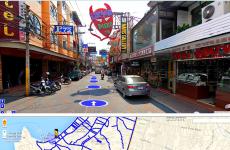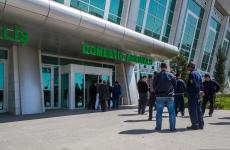What is the currency in Warsaw. Where can you change money in Warsaw? Polish zloty to Ukrainian hryvnia exchange rate
Where and how best to change money in Poland. Exchange offices, rates and all useful information on the topic of currency exchange in Poland.
The official national currency of Poland has been the Polish zloty (denoted as zl. or PLN) for almost 100 years. On January 1, 1995, banknotes of a new type were issued into the country's currency circulation - banknotes in denominations of 10, 20, 50, 100 and 200 zlotys (all with portraits of the kings of Poland) and small change coins in denominations of 1, 2, 5, 10, 20, 50 groschen as well as coins of 1, 2 and 5 zlotys.
Even though Poland has been part of the European Union for several years, in the future it may switch to using the euro, but there are no such forecasts from the Polish government for the next 5 years.
In this article you will find information about the zloty exchange rate to the dollar, euro and hryvnia in Poland, as well as useful tips about the specifics of the exchange rate in Poland, ways and nuances of exchange, currency exchange points and features of non-cash payments in Poland.
The current exchange rate of Polish zloty for hryvnia, rubles, and euros (at the NBU rate) can always be found on the main page of the site -
Exchange rates to zloty in Poland
Since its introduction in 1995, Poland has used a floating (market) exchange rate regime. Like any other world currency, the zloty can change due to various economic situations both within Poland itself and in the global foreign exchange market in general.
In Poland, foreign exchange transactions can be carried out by banks and private Kantor exchange offices (cantors). No documents are required to exchange currency. Changing zlotys from private individuals is illegal and dangerous, as scammers are common.
People most willingly change the euro, since it is the currency of the European Union. Next in popularity are the dollar and other banknotes. You can exchange almost any currency in banks, but offices usually limit themselves to a few of the most profitable or popular currency exchanges.
Polish zloty to US dollar exchange rate
History of zloty to dollar exchange rate:
Here you can see the current average purchasing rate for US dollars at branches of the National Bank of Poland. The rate at exchange offices (offices) may differ from the NBP rate by 1-2 groschen.
Polish zloty to Ukrainian hryvnia exchange rate
Some people, when planning a trip to Poland, try to cross the border with existing zlotys. Others prefer to exchange currency after crossing the border, since the zloty exchange rate in Poland suits them better.
For example, there is an opinion that it is worth exchanging hryvnias for zlotys in Ukraine, and the zloty exchange rate to the dollar and euro in Poland is more profitable, although it is difficult to answer unequivocally, because the exchange rate is unstable and the situation changes almost every day.

Average purchase rate in Poland:
| Kursy średnie NBP | |||
| 1 UAH | 0,1420 | 0,50% | 2018-07-13 |
Currency exchange in Poland (hryvnia, dollars and euros to zlotys)
Currency exchange offices in Poland are called "Kantor" or "Kantor wymiany walut". They are usually located at train stations or in the historical center of the city (banks, as a rule, do not have exchange offices).
Exchange offices at train stations may have a lower exchange rate than others. But there are many exceptions to this rule (for example, at the train station in Wroclaw, the rate at exchange offices is no lower than elsewhere).
At the train station in Warsaw, exchange offices set a good rate on weekdays, but on weekends (or Saturday afternoons) they set a lower rate than usual.
A good option for exchanging money for Polish zlotys is offices (currency exchange offices) in front of the Polish border. Due to the large currency turnover, the difference between the purchase and sale prices there is not as significant as in other places and Polish zloty is always available.
Mostly these exchange offices are located at gas stations near the border of Ukraine with Poland, or next to points of sale of insurance policies or small shops. Such cross-border exchange offices usually have the best exchange rate for Ukrainian hryvnia to Polish zloty. If you want to exchange a large amount of currency, you can always try to negotiate a more favorable exchange rate for hryvnia to Polish zloty.
There are also exchange offices at each border checkpoint. But the exchange rate at the border is not the best, neither for exchanging hryvnias for zloty, nor for exchanging dollars or euros. Try to plan your expenses so that you can either exchange the required currency at the border, or have the opportunity to do this already in Poland.
There are also exchange offices near the border of Belarus and Poland.
You can exchange hryvnia, dollars and euros, as well as other cash in Poland for zlotys in banks or private exchange offices (cantors).
In Kantor's you can exchange not only dollars and euros, but also almost any European currency. (Rubles and hryvnias are also accepted, but at a not very favorable rate)
The exchange rate for buying and selling currencies is posted on boards at the entrance to the exchange office, or directly at the window.
No interest is charged for the exchange. Unlike Prague, Polish exchange offices do not resort to deception (for example, indicating in small print that amounts less than 1 thousand euros are exchanged at a different rate - as the Czechs do). Those. as much as is written on the board - that's how much you will receive in your hands. To exchange currency at offices you do not need any documents.
Unlike Russian banks, where currency exchange operates in every branch, in Polish branches of banks there is most often no currency exchange.
Please note that hand-held currency exchange is prohibited in Poland. Therefore, when going to the fair, it is better to take care of the exchange in advance. Exchanging hands often becomes a profitable business for scammers.
When thinking about where to exchange currency in Poland, many tourists rush to do it in banks, as they consider it safe, and the exchange rate in Polish banks is more favorable, but do not rush to conclusions, exchange in offices is an equally reliable way to exchange cash. And the exchange rate there is usually more favorable than in banks.
In large cities such as Krakow, Warsaw, Gdansk, Wroclaw and other most popular among tourists, there are many offices; you can find out the hryvnia exchange rate in Poland, the euro and dollar exchange rates in Poland at almost every step. Favorable currency exchange rates in Poland are offered by offices located in shopping centers and galleries. There may even be several of them in each shopping center; you just have to choose the one with the most favorable exchange rate for the currency you need.
There are enough exchange offices in small towns, especially in the border zone, where they operate both separately and at chain supermarkets or even some regular stores. Offices in Poland work mainly from 10:00 in the morning, but in tourist places there are also exchange offices with round-the-clock opening hours.
Where is the best place to buy Polish zlotys?
Often, before traveling to Poland, it is more profitable to buy Polish zlotys in your own country. Let's consider such opportunities in banks in Belarus, Russia and Ukraine. Naturally, in addition to the banks listed in this article, there may be others, so this list is only approximate, and you can advise in the comments where else it is possible to buy Polish zlotys outside of Poland.
Where to buy zlotys in Ukrainian banks
The three banks with the widest network of branches where you can buy zloty are:
- Ukrgasbank;
- Ukreximbank;
- Credit Agricole Bank.
According to reviews, the selling rate for all three banks is the same, but the purchasing rate for zloty varies significantly.
In addition to the official rate, some banks may charge an additional percentage for conversion. In addition, the amount of currency is often limited (only those zlotys that were previously sold by the population are sold). Therefore, all details must be clarified at a specific bank branch.
Buying Polish zlotys in Russia
On the territory of the Russian Federation, most banks claim to work with zlotys. For example, you can exchange currency in the following branches:
- Sberbank;
- VTB 24;
- UNISTREAM.
The courses are approximately the same. However, due to the low demand for Polish zloty, this currency is imported into branches in small quantities, which greatly depend on the distance of Poland from a particular city. If it is not difficult to find currency in banks in Kaliningrad, then in Moscow it is not present in all branches, and in Vladivostok you will have to run hard to collect the required amount. There were cases when Sberbank even stated that they did not work with zlotys, but in a neighboring branch of the same bank it was easy to buy several banknotes.
Most Russians (except for residents of Kaliningrad) prefer to cross the Polish border through Belarus. In some cases, it makes sense to exchange money in this country.
Buying zlotys in Belarus
The demand for zloty in the Republic of Belarus is quite high, which is why currency exchange services are widespread. Almost all Belarusian banks are engaged in conversion.
For example:
- Belinvestbank;
- Absolut Bank;
- VTB Bank (Belarus);
- Belarusbank;
- Belgazprombank;
- Belinvestbank;
- BNB-Bank.
The spread of rates is quite large, so it is necessary to compare the prices of several specific banks at the time of exchange. Some banks will be able to sell zlotys not only for Belarusian rubles, but also for Russian rubles or hryvnia, although the exchange rate may turn out to be unfavorable.
Dollar and euro exchange rate in Poland
Many people believe that it is profitable to change international currencies, namely dollars and euros, in Poland. The exchange rate of the dollar and euro in Poland is more stable and does not change constantly, and if there are any fluctuations, they are not so significant and depend on the situation on the international market.
Poland is a European country, so the zloty to dollar exchange rate depends on the euro to dollar exchange rate, and mainly in Poland there are fluctuations in the exchange rate of the Polish currency to the US dollar.
It also depends on where exactly you will exchange currency, and sometimes even on whether it is a weekend or not.
Please also pay attention to this important nuance:
often, despite the competition, offices in tourist cities in Poland (Krakow, Warsaw, Wroclaw) lure potential clients with advertising displays with attractive and profitable figures for the dollar and euro exchange rates, but usually this is the exchange rate for the sale of currency, not its purchase.
Before exchanging, be sure to look again at the numbers on the currency exchange board, or check the currency purchase rate from the person who will carry out the exchange.
How much money should you have when crossing the border to Poland?
When crossing the border into Poland, Polish customs (Sluzba Celna) and border authorities (Straz Graniczna) have the right to check that you have the necessary funds to stay in Poland or Europe. How much money and in what currency do you need to have in order to cross the Polish border?
If you are traveling to Poland for up to 3 days, you need to have 300 zlotys or their equivalent in any other currency, which you can subsequently exchange at the exchange rate in Poland, in order to confirm your solvency.
Cash withdrawal from ATMs in Poland
If you run out of cash, but have some left on your bank card, you can withdraw it from any ATM in Poland, and your bank may charge a commission (it all depends on the terms of use of the card).
You should find out about the amount of the commission, as well as other conditions for withdrawing cash in Poland, from the bank whose credit card you use, even before traveling to Poland. And yet, it is more profitable, if, of course, there is such an opportunity, not to withdraw cash, but to pay with a payment card in shops, hotels, restaurants or other establishments in Poland.
In Poland, all ATMs dispense cash in Polish zlotys, but some have the ability to withdraw funds in euros.
Payment by payment card abroad in Poland
In Poland, paying by card is very common - almost anywhere, even in a small rural store, you can pay by card. Often, those who live in Poland do not even have a lot of cash with them.
As is the case with cash withdrawals, it all depends on your bank and its operating conditions. When paying by card in Poland, no commission from the Polish side will be deducted from you. But you should find out in advance about the terms of currency conversion and commissions from your bank.
Is it possible to pay in Euros in Poland?
According to the current legislation, since May 1, 2004, there is no ban on paying for services in Euros. When you pay in Euros and the seller accepts payment in Euros, neither of you is breaking the law.
However, the law states that in order to make a payment in Euros, both parties must agree to this. In other words, no one is obliged to accept Euros from you, just as no one is obliged to demand Euros as payment. For this to happen, there must be “good will” on both sides.
There is also no fixed exchange rate between the euro and the zloty. Therefore, some adhere to the current course of the NBP (national Polish bank), others set their own.
To join the eurozone, a number of conditions must be met: this includes limiting the budget deficit, these and price stability (inflation should not exceed by more than 1.5% the average inflation in the richest countries of the eurozone), the national currency exchange rate must be stable (not fluctuate more than +/- 15%), and the interest rate cannot (by more than 2%) exceed the eurozone average.
Currently, even the approximate date for Poland’s entry into the Eurozone has not been determined.
National currency of Poland- Polish zloty PLN. One Polish zloty consists of 100 grosz. You can pay in Poland only national currency.
Each banknote has a specific symbol to help people with low vision recognize its meaning. The banknotes depict former reigning kings of Poland.
Appearance of the currency of Poland
Money in Poland
Cash money in Poland exist in paper bills and coins. Plastic cards in use (preferably debit): Visa, MasterCard, Cirrus and Maestro. Credit cards are accepted in many hotels and restaurants, car rental companies, etc. Traveler's checks are also accepted almost everywhere.
Answering the question, " what money to take to Poland?", we can say that the easiest currencies accepted for exchange are € and $. In some supermarkets (TESCO) at special cash desks, which are marked with a EURO icon, you can pay in this currency.
How much money to take to Poland?
Answering the question, " how much money to take to Poland?", we can say that prices in Poland remain quite low for travelers. Of course, if you are going to rent a car and rent a room in a luxury hotel, it will cost the same as in Western Europe.
Approximate prices in Poland:
- Liter of gasoline - 1.35 €
- Car rental per day (without driver) - 40 €
- Travel by public transport - 1 €
- Lunch in a cafe per person - 6 €
- Coca-Cola 1 l - 1 €
- Vodka 0.5 l - 5 €
- Cigarettes - 3 €
Money exchange
You can exchange currency at specialized exchange offices (called Kantor or Kantor wymiany walut), which work 7 days a week in big cities. Exchange offices in banks are rare, and besides, the exchange rate there is less favorable.
remember, that Kantors may refuse to exchange if there are any inscriptions or seals on the bills (for example, handwritten numbers).
You can also exchange money at the post office, which is open until 18:00 on weekdays.
Transfer money to Poland
Transferring money to Poland can be done via bank transfer and express money transfers such as Western Union (www.westernunion.com).
Banks of Poland
Majority banks in Poland open from 08:30 to 13:00, central offices are open until 17:00, and also on Saturday, but only until 14:00.
Central Bank of Poland is the National Bank of Poland. Also in the country there are smaller national and international banks: Citibank, Bank Przemyslowo-Handlowy, Bank Slaski, ING Barings, Raiffeisen Bank, Millennium Bank, Nordea Bank, HSBC Bank.
The StudentPOL program uses its many years of experience to give program participants advice that will help them live more profitably and comfortably in a new place. Here's one of them.
Foreign students often have a question: where to change money? The question is not so important if we are talking about small amounts, but if you want, for example, to pay for your studies and exchange 2000 euros, then the difference in the exchange rate of 1 penny turns into 20 zlotys in your hands. The difference of 3 groschen is, respectively, 60 zlotys, and for the sake of this amount it is worth thinking about which currency exchange office to choose.
Rule #1- never change money in Polish banks. For example, in Belarus only banks change money, so many Belarusians change money in Poland by analogy. Is it a good idea? Judge for yourself - here are the exchange rates of the dollar and euro to zloty as of November 5, 2014 at BankMillennium - one of the largest banks in Poland (the first is the buying rate, the second is the selling rate):
EUR: 4.0786 4.3833
USD: 3.2564 3.4996
As a result, on each exchange you lose 3.6% of the total amount. By exchanging 2000 euros, you lose 72 euros.
Rule #2- at exchange offices located in large shopping centers, change only small amounts. The "exchangers" in shopping centers are not banks, so the rate in them is much better. However, it is also difficult to call it optimal - due to its convenient location and high rental costs. For example, at the exchange office in the Złote Tarasy shopping center (in the very center near the station), the exchange rates as of November 5, 2014 are as follows:
EUR: 4.14 4.29
USD: 3.31 3.43
On each exchange you lose 1.9% of the total amount. If you need to change 50 euros, the exchange office commission will be less than 1 euro - it’s hardly worth working hard to reduce this amount. But from 2000 euros the exchange office will take 38 euros - in this case you should think twice. Often, currency exchange offices in shopping centers offer the best rate for large amounts, but the commission is still significant.
Rule #3- if you need to change large amounts, take the time to go to Lombard Warszawski. This place opened just over a year ago and has earned a reputation as the best currency exchange place in Warsaw. Perhaps they are able to offer better prices because currency exchange operations are not their main activity - pawnshop services and trading in valuable coins are. Be that as it may, you cannot find a more favorable rate in Warsaw. Here are their quotes as of 11/05/2014:
EUR: 4.205 4.25
USD: 3.36 3.405
By exchanging with them, you lose only 0.5% of the total amount on the exchange; Moreover, Lombard Warszawski can offer an even more favorable rate if you are exchanging a significant amount.
Thus, if you exchange 2000 euros, depending on the place of exchange you will receive the following amounts in zlotys:
Bank Millennium - 8157.2
Exchange office in Złoty Tarasy - 8280
Lombard Warszawski - 8410
Lombard Warszawski is a 10-minute walk from the Ratusz Arsenal metro station and a 3-minute walk from Kino Femina. If you are far away, then going there to change 50 euros is hardly worth it, but if you exchange 2000 euros, you will win 130 zlotys - this amount is worth spending an hour on the road.
Tour operator in the Baltics, Caucasus and Central Asia
We bring to your attention information that may be useful when traveling to Poland.
Capital of the country
Time
Time in Poland is Central European, 2 hours behind Moscow (GMT+1).
During the summer, the transition to daylight saving time occurs.
Air travel
The flight is carried out using individual tickets from the airport. Sheremetyevo. The time, flight number and airport are indicated on your ticket. The flight takes about 2 hours (it all depends on the airport of arrival). Check-in at the airport begins 3 hours before departure, ends 40 minutes before departure.
Warsaw(Warszawa) From the airport Okecze(Okecie) the city center can be reached by city buses 175 and 188 (about 20 minutes). A taxi to the city center costs PLN 15-20.
Gdansk(Gdansk) Bus 110 takes passengers from the airport Renbekhovo(Rebiechovo) to the Gdansk-Wrzeszcz station, and bus "B" from the airport to the PKP train station in Gdansk. A taxi to the airport costs PLN 30-35.
Krakow(Krakow) From the airport Balice(Balice) bus 192 goes to the city center. A taxi to the city center costs PLN 40.
Katowice(Katowice) To the airport Pyrzowice(Pyrzowice) can be reached from the railway station in Katowice by bus 885, from Bytom by buses 53, 87 and 17, from Tarnowski Gory by bus 142.
Rzeszow(Rzeszow) To the airport Yasenka(Jasionka) buses leave the city on weekdays: route 2 at 12:00, route 14 at 12:05, on weekends - routes 2 and 14 at 11:50.
Wroclaw(Wroclaw) From the airport to the city you can take a minibus (minibus), which departs from the "Lot" stop, the ticket price is 15 PLN, or by city bus 406. A taxi to the city costs 25-30 PLN.
Zielona Gora(Zielona Gora) From the airport, located 34 kilometers from the city center, a bus runs, which picks up passengers in the morning at 5:50 (from the Qubus hotel and PKS station), and in the evening at 21:30 picks up those arriving.
Railroad crossing
Trains to Poland from Moscow leave from Belorussky Station.
No. 9 "Polonaise" - to Warsaw
Daily
Moscow 15:52 - Vyazma (18:57-19:20) - Smolensk (21:25-21:30) - Orsha Center. 21:52-22:04 - Minsk 0:32-0:43 - Brest Center. 4:28-6:35 Terespol 5:53 - Lukow 7:56 - Warszawa Wschodnia 9:59 - Warszawa Centralna 10:26
No. 11 - to Warsaw
Daily
Moscow 23:40 - Vyazma 2:42-3:05 - Smolensk 5:05-5:10 - Orsha Center. 5:33-5:48 - Minsk 8:16-8:42 - Baranovichi 10:27 - Brest Center. 12:40-15:03 - Terespol 14:21 -Lukow 16:25 - Warszawa Wschodnia 18:20-19:31 - Warszawa Centralna 19:38
Visa, customs and passport control, customs information
On December 21, 2007, Poland joined the Schengen bloc of countries.
Now the Polish consulate issues Polish Schengen visas with which, in addition to Poland, you can visit any European countries included in the Schengen zone. Foreigners entering Poland must have: medical insurance(covering, if necessary, the cost of treatment in Poland). An exception to this rule is made for citizens transiting through the territory of Poland. They do not need a medical insurance policy. In addition, foreigners entering Poland must have necessary funds: 100 zl for each day of stay (but not less than 300 zl). Export of cash currency: Please note that when exporting from Russia, you do not need to declare amounts up to $3,000. If you wish, you can include in the declaration any amount you have (i.e., less than $1,500). Removal of valuables and jewelry: All gold products must be included in the customs declaration. It is better to ask a customs officer about valuable jewelry you have. Summary. What to indicate in the customs declaration: there is a universal rule: if you are in doubt about what to include and what not, ask the customs officer about it before submitting the declaration. You can get clear advice on the customs rules in force on the day you fill out the declaration. Goods for personal use, including video and photo cameras, do not need to be declared. The main restrictions relate to the import of alcohol and tobacco products. You can bring alcoholic beverages:
- vodka (and other alcohol-containing drinks) - no more than 1 liter;
- wine - no more than 2 liters;
- beer - no more than 5 liters. Tobacco products:
- cigarettes - no more than 200 pcs.;
- cigars - no more than 50 pcs.;
- tobacco (including snuff) - 250 g. There are also restrictions on the import of perfumery products. So, you can import:
- perfume - no more than 50 ml;
- eau de toilette - no more than 250 ml.
However, this usually does not apply to the import of perfumes for one's own use. There are also restrictions on the import of medicines: you can import them only for your own needs (accordingly, the quantity is determined by your needs and the ability to convince the border guard that the quantity being exported is reasonable).
Safety conditions
We ask you to strictly comply with the legislation of the Russian Federation, Poland and transit countries. Comply with all the rules and conditions of personal safety, fire safety, hygiene and sanitary and epidemiological rules, namely: all rules for staying at airports; all flight (transfer) and baggage rules specified in your ticket; all rules for traveling by road, ground and underground transport, country and international trains and strictly follow the instructions and instructions of the staff; all rules and conditions for staying in public places, in hotels, restaurants, bars, cafes, discos, clubs, casinos, sports centers, swimming pools, museums, theaters, exhibitions, when visiting cultural and architectural monuments and strictly follow the instructions and instructions of the staff. Do not leave your belongings and valuables unattended; if possible, use safes in rooms, hotels, and banks. Do not carry large sums of money with you, hold photo and video equipment tightly in your hands.
Currency, money exchange
The national currency is zloty. The coin of change is a penny (grosz).
1 zl = 100 gr. The official abbreviation for the zloty since 1995 is PLN (Polish new zloty).
Euro - 4.0472 zl Russian ruble 0.1034 zl
Currency exchange offices in Poland are called "Kantor" [kAntor] or "Kantor wymiany walut". They are usually located at train stations or in the historical center of the city (banks, as a rule, do not have exchange offices). Exchange offices at train stations may have a lower exchange rate than others. At the train station in Warsaw, exchange offices set a good rate on weekdays, but on weekends (or Saturday afternoons) they set a lower rate than usual. Exchange offices are usually open from 8:00-9:00 to 16:00-18:00. On Saturday - until 14:00, on Sunday and holidays - closed. When most exchange offices do not work, the remaining ones exchange currency at a not very favorable rate, sometimes 20% less than usual. Therefore, we advise you to take care of currency exchange in advance. Attention to those who come to Poland on Saturday (and pre-holiday days)! Try to exchange money before lunch, because on Saturdays (and pre-holidays) exchange offices close at 14:00. And until Monday (or until the end of the holidays) you will have to exchange currency at an unfavorable rate.
How institutions work
Deli.The number of restaurants, cafes, bars, pizzerias, and night restaurants increases from year to year. There are also restaurants that are part of the international system such as: Mc Donald's, Burger King, Kentucky Fried Chicken, Pizza Hut and others. Traditional Polish dishes are usually served in stylish restaurants located in old buildings with well-equipped interiors.
The shops in Poland are run by various companies. Grocery stores in the largest cities on weekdays are open from 6:00 to 18:00 or 19:00, on Saturdays - from 7:00 to 13:00: on Sundays, holidays and at night some grocery stores are open in large cities. This primarily applies to supermarkets. On weekdays, department stores and service points are open from 10:00 or 11:00 to 18:00 or 19:00. In small towns, shops close as early as 17:00. Supermarkets In recent years, many supermarkets have appeared in different cities of Poland, open seven days a week from early morning until late evening. In addition to the fact that you can buy almost everything there, they are distinguished from other stores by lower prices. Polish families come to supermarkets to immediately buy goods for a long time, just like in Russia to wholesale markets. There are free parking lots next to supermarkets. To take the cart, you need to insert a coin of 1 or 2 zl into a special lock, and when you bring the cart to the place, you get the coin back. (You can throw the cart anywhere, but then the coin will be lost.) The post office is usually open from 8:00 to 20:00. In voivodeship cities, some post offices operate 24 hours a day. In large cities and tourism centers, automatic telephone communication has been installed. At the post office you can send parcels, registered letters, express letters, air letters, telegrams, order a telephone conversation, send a fax, buy stamps, envelopes, post cards. Main post offices in voivodeship cities are equipped with telexes and telefaxes. Information desk for postal and courier services in Warsaw (48-22) 620 45 51.
Important phone numbers
Ambulance - 999
Fire service - 998
Police - 997 Help for cell phone owners - 112
24-hour car assistance service - 981
Warsaw City Watch - 986 City Communications Information - 913
Country telephone information desk - 912;
Reference long-distance communication codes - 912;
Information codes for international communication - 908
City information - 911
Ordering international communication negotiations - 901
Sending telegrams by phone - 905
Telephone communications
48 - Poland code
There are three types of telephone booths:
- machines that accept magnetic cards,
- machines that accept both magnetic and chip cards,
- machines that accept only chip cards.
Telephone cards are sold at all newsagents. Ask for them even if they are not on display. Cards are designed for a certain number of “impulses”: 25, 50 or 100. One “impulse” costs 0.355 zl (cards cost respectively 25 impulses - 11.30 zl, 50 - 20.40 zl, 100 - 37.20 zl ). The conversion of the “impulse” into minutes depends on the nature of the call and the time of day. So, for local calls from 8:00 to 22:00 one “pulse” is equal to 3 minutes, and from 22:00 to 8:00 - 6 minutes. Please note that in Poland, when calling cell phones (telefon komo’rkowy, “komo’rka” [telefon komurkova] or colloquially [komurka]), the caller (and not the owner of the mobile) pays for the conversation. Such a conversation is as expensive as an international one. Mobile phone numbers here begin with the number zero. Therefore, be careful what number you dial. The expression “Call me on my mobile” in Poland is not a sign of coolness, but a sign that you are being subjected to additional expenses. By the way, the payment for calls to some paid services whose numbers begin with zero depends on the fourth digit of the number (0-NNX-...). The higher it is, the more you will have to pay. The exception is “info lines”, for which you do not pay anything for a call. These are numbers starting with "800". When calling to numbers starting with “801” and “804” you pay as for a local call. In Poland, time-based payment for telephone calls applies everywhere. The monthly payment for a landline telephone consists of a fixed amount (about 40 zl), and payments for local calls, calls to mobile phones and long-distance calls. In the monthly telephone bills sent to you, all items are listed separately.
Transport
In Polish cities, public transport is usually represented by buses and trams. Sometimes there are trolleybuses. There is a metro in Warsaw. Transport usually operates from 5:00 to 23:00. At night, only night buses operate, and travel on them costs 2 times more. The fare is usually 0.30 - 0.50 euros. There are no discounts on travel for foreign children or students (only in Warsaw - with an ISIC student card). Baggage must be paid additionally. Please also note that express bus tickets are more expensive. Transport tickets can always be bought at newsstands, even if they are on display. Tell the kiosk: "Poprosze bilet komunikacji miejskiej" (please ask for a ticket for public transport). Please note that in some cities, for example in Poznan, there is a time-based fare, when you have to pay not for the fact of the trip, but for the time. Up to 10 minutes - one price, over - 2 times more expensive. In most cities, tickets are also valid for 1 day, 3 days, and a week. Find out in advance what payment system is in effect in the city where you are traveling. Tickets must be validated immediately upon boarding. Traveling or carrying luggage without a valid ticket is punishable by a heavy fine. Taxis in Poland operate in every city. Cars wait for passengers in special parking lots, for example, at railway stations, at airports, and at hotels. Each car has the inscription "Taxi" and the telephone number of its company.
It is very convenient to order a taxi by phone to the specified address. Ordering a taxi is free. You can order a car either by number 919 (unified for all of Poland), or find the number of another company - they are published in major newspapers and on advertising leaflets. When ordering, you need to provide the address of the house where you will wait for the car, and your phone number (so that they can call you back). In large cities, a taxi arrives in 5-10 minutes. When ordering a taxi by phone, the trip will not cost you more, but on the contrary, it will be cheaper. On weekends, outside the city limits and from 10 pm to 6 am, the tariff increases. Payment for travel between cities is agreed upon with the driver each time.





